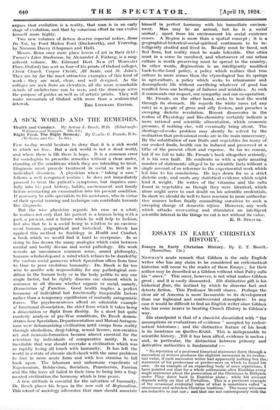A SICK WORLD AND THE REMEDIES.
FEW to-day would hesitate to deny that it is a sick world in which we live. But a sick world is not a dead world, and where there is life there is hope. It is a common error for sociologists to prescribe remedies without a clear under_ standing of the conditions which they are intending to treat. Diagnosis must precede treatment in social as well as in individual disorders. A physician when " taking a case " follows a well recognized routine : he does not immediately proceed to treat the patient's symptoms, but inquires care- fully into his past history, habits, environment and family before conducting an examination into his present condition. If necessary he calls specialists to his assistance, who in virtue of their special training and technique can contribute towards the diagnosis.
But the wise physician regards his case as a whole, he realizes not only that his patient is a human being with a past, a present, and a future which he will help to fashion, but also that he is a social being in relation to an environ- ment human, geographical and historical. Dr. Brock has applied this method to Sociology in Health and Conduct, a book which we would find it hard to overpraise. In so doing he has drawn the many analogies which exist between mental and bodily disease. and social pathology. His work reveals an uncommon common sense, sound philosophy, humane scholarship and a mind which refuses to be dazzled by the various social panaceas which Specialism offers from time to time to poor credulous humanity. Dr. Brock is far too wise to ascribe sole responsibility for any pathological con- dition in the human body or in the body politic to any one single factor, but he rightly discerns one element_ which is common to all disease whether organic or social, namely, Dissociation of Function. Good health implies a perfect harmony of individual but functionally inseparable factors rather than a temporary equilibrium of mutually antagonistic forces. The psycho-neuroses afford an admirable example ar functional dissociation, the chief form which it takes being a dissociation or flight from Reality. In a short put quite masterly analysis of pre-War conditions, Dr. Brock demon- strates how Specialism, Departrnentalism and Mutual Antagon- isms were dehumanizing civilization until escape from reality through alcoholism, drug-taking, sexual licence, non-creative art and neurosis-formation became almost essential for the retention by individuals of comparative sanity. It was inevitable that war should overtake a civilization which was so rapidly losing all touch with humanity. It has left the world in a state of chronic shell-shock with the same problems to face in more acute form and with less stamina to fall back upon. The inhuman and unhumane expedients of Napoleonism, Bolshevism; Socialism, Prussianism, Fascism and the like have all failed in their time to bring into a frag- mented civilization the harmony which is true peace.
A new attitude is essential for the salvation of humanity. Dr. Brock places his hopes in the new cult of Regionalism. This school of sociology advocates that man should associate himself in perfect harmony with his immediate environ- ment. Man may be • an animal, but- he is a social " animal ; apart from his environment his social existence -* ceases. A Region is more than a -spatial concept ; it is a geographical-historical-social-spiritual continuum to be in- telligently studied and lived in. Reality must be faced, not fled from, -but reality must be made tolerable. Our cities must in a sense be ruralized, and whatsoever of our urban culture is worth preserving must be spread to the country.- In other words, Regionalism is an intelligently modified back-to-the-land policy, a policy which realizes that true culture in more senses than the etymological has its springs in agri-culture, a policy which seeks to rehumanize and decomplicate life without sacrificing whatever of good has resulted from our heritage of failures and mistakes. As such it commands our respect, our sympathy and our co-operation.
Mr. Froude, on the other hand, seeks to heal the world through its stomach. He regards the white races (at any rate) as a people of gross and silly feeders, and preaches a sweeping dietetic revolution. Recent discoveries in the realms of Physiology and Bio-chemistry certainly indicate a more rational and scientific alimentation, which economic pressure, if nothing else, will eventually bring about. The shortage-of-cooks problem may shortly be solved by the realization that professional cooks are in the main unnecessary. By the substitution of raw fruits and vegetables for many of, our cooked foods, health can be induced and preserved at a tithe of the present effort and expense. So far we concur, but if we fail to take Mr. Froudc's book altogether-seriously,."' it is his own fault. He confronts us with a quite amazing: number of statements alleged to be scientific facts without a single account of or reference to the experimental work which led him to his conclusions. He lays down for us a strict dietetic code, and omits any statistical evidence which might lend it weight. He writes of the vitamins and the salts. found in vegetables as though they were identical, which alone might serve to cast doubt on his scientific credentials.' In short we should do well to have recourse to more authorita- tive sources before finally committing ourselves to such a sweeping change of domestic regime. However, any work. which attacks over-eating and stimulates an intelligent scientific interest in the things we eat is not without its value.
E. B. Smauss.


































 Previous page
Previous page